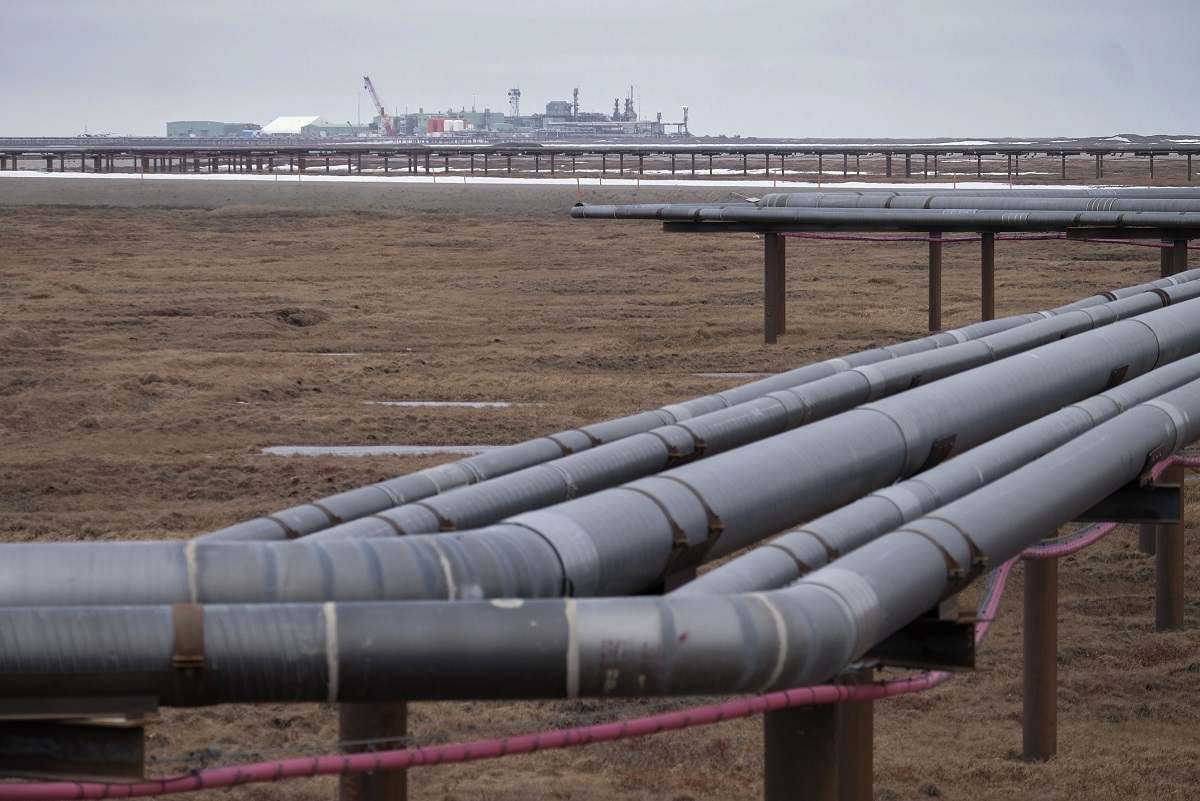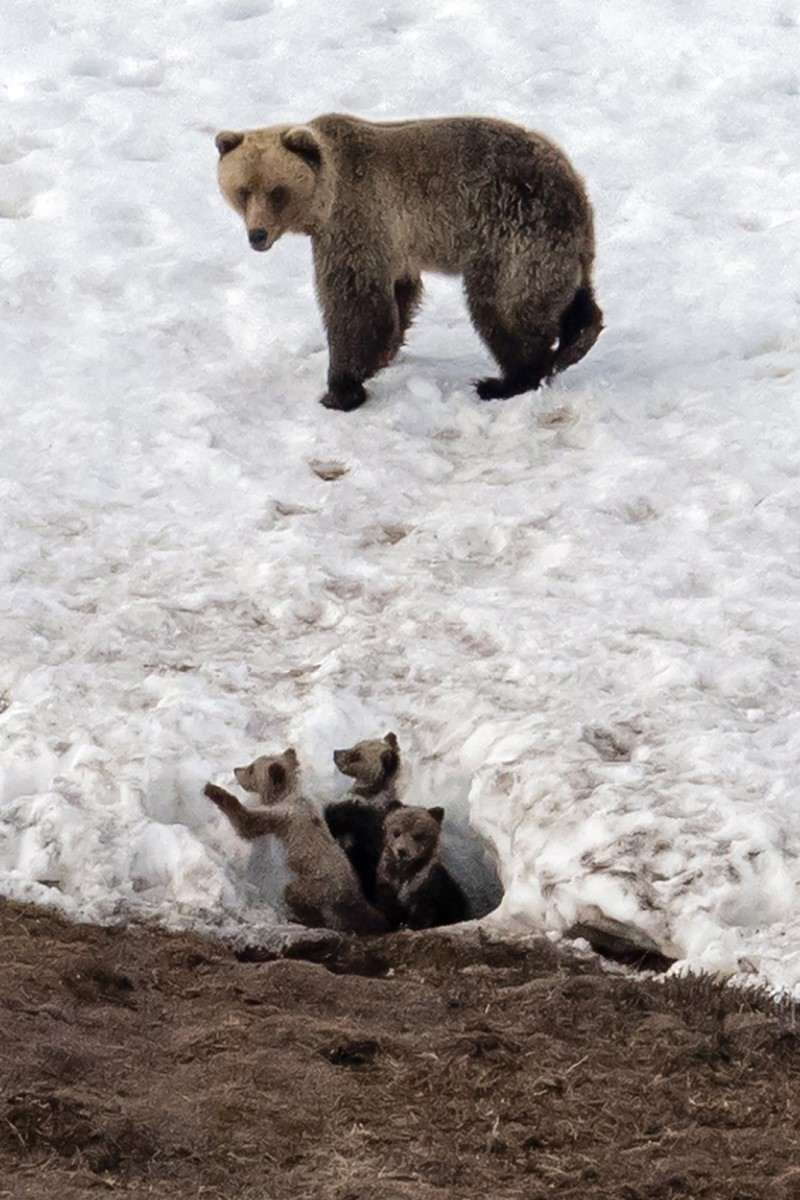
Oil pipelines stretch across the landscape outside Nuiqsut, Alaska, where ConocoPhillips operates the Alpine Field, in May 2019.
14:34 JST, March 14, 2023
The Biden administration approved one of the largest oil developments on federal land Monday, giving a win to Alaskan industry and its congressional allies despite protests that the project would undermine U.S. efforts to phase out fossil fuels worldwide.
Opponents hoped President Biden would reject energy giant ConocoPhillips’s multibillion-dollar drilling project, called Willow, on Alaska’s North Slope. But facing the prospect of having such a decision overturned in court, the administration agreed to let the oil company build three pads in the National Petroleum Reserve-Alaska (NPR-A), the nation’s largest expanse of public land, according to a federal Record of Decision posted Monday.

A bear looks after her three cubs in North Slope Borough, Alaska, in May 2019.
The decision shrinks the project from the five pads that ConocoPhillips originally proposed, but allows what company officials have described as a site large enough for them to move forward. In a statement Monday, the company said it will start construction immediately on at least one gravel road and move toward a final investment decision on the full project.
The high-stakes project has been challenging for White House officials, prompting weeks of agonizing meetings with advocates on both sides of the issue. Willow marks the culmination of years of debate over the future of drilling in the Arctic. Environmentalists have made fighting it a top priority, and in recent weeks, young activists have launched a #StopWillow TikTok campaign to apply further pressure.
During the 2020 campaign, Biden had pledged to ban “new oil and gas permitting on public lands and waters,” and environmental activists argued that the project would undercut his lofty climate pledges.
In a statement Monday, the Interior Department did not fully explain its approval of the project but made note of ConocoPhillips holding lease rights for the region, which the company has held since the late 1990s. The agency highlighted its decision to reject approvals for two of the five proposed drilling sites and to pursue other conservation measures for the region that it announced late Sunday.
“The actions will create an additional buffer from exploration and development activities near the calving grounds and migratory routes for the Teshekpuk Lake caribou herd, an important subsistence resource for nearby Alaska Native communities,” the department said. “They significantly scale-back the Willow Project within the constraints of valid existing rights under decades-old leases issued by prior Administrations.”
The other measures announced Sunday cover 16 million acres of land and water in Alaska. That includes putting the Arctic Ocean off-limits to U.S. oil and gas leasing and new Interior regulations to protect nearly 13 million acres in the NPR-A, including ecologically sensitive areas that provide habitat for thousands of caribou and shorebirds. ConocoPhillips will also relinquish oil rights for roughly 68,000 acres on leases it currently holds in NPR-A, about 60,000 of it in the Teshekpuk Lake Special Area, Interior said Monday.
“This was the right decision for Alaska and our nation,” Ryan Lance, chief executive of ConocoPhillips, said in a statement. “Willow fits within the Biden Administration’s priorities on environmental and social justice, facilitating the energy transition and enhancing our energy security, all while creating good union jobs and providing benefits to Alaska Native communities.”
The decision to allow three pads will also enable the construction of hundreds of miles of roads and pipelines, airstrips, a gravel mine and a large processing facility on near-pristine tundra and wetlands in the reserve. While originally set aside for oil production 100 years ago, only two sites produce oil there now – both run by ConocoPhillips – and the expanse provides important habitat for migrating caribou, waterfowl and other wildlife.
Few drilling projects rival Willow in size, according to the energy consulting firm Wood Mackenzie; ConocoPhillips estimates that Willow will operate for the next 30 years. The firm’s other two projects producing oil on the reserve, Alpine West and Greater Mooses Tooth, have smaller reserves. The last time the federal government approved such a large operation was nearly eight years ago, when it signed off on BP’s Mad Dog Phase 2 in the Gulf of Mexico.
The U.N. Intergovernmental Panel on Climate Change, which includes hundreds of top climate and energy experts, has said that the world must zero out greenhouse gas emissions by the middle of the century to have a hope of meeting its climate goals and avoiding catastrophic warming.
While some in the administration wanted to block the development, ConocoPhillips’s control of federal leases on the NPR-A since 1999 gives it a strong position to challenge any federal decision that impedes its ability to develop, legal experts said. Allowing three pads protects the administration from a costly legal battle. It also relieves the administration of political fallout from allies in Alaska – including Rep. Mary Peltola, the first Democrat from Alaska elected to the House since 1972 – who say the project will boost the state’s faltering economy.
Environmentalists say the proposed conservation measures won’t come close to offsetting the damage Willow will cause the planet. They had pushed the White House to block the project despite the cost, saying anything less would betray Biden’s promise to cut national emissions at least in half by 2030 compared with 2005 levels. And Alaskan officials expect those groups to sue to try again to stop the project.
“We will consider every appropriate tool in our continuing fight to stop the Willow climate bomb,” Christy Goldfuss, chief policy impact officer at Natural Resources Defense Council, said in a statement. “Willow is a project out of time. With science demanding an end to fossil fuels, this locks in decades more dependence on oil.”
After years of planning and bureaucratic wrangling over the Arctic reserve, ConocoPhillips initially received permits for Willow during the final year of the Trump administration. The company’s plan includes drilling on top of permafrost and constructing a network of chilling tubes to keep it frozen even as the region warms.
Environmentalists sued, and a federal judge blocked construction permits in 2021 because the government failed to assess how burning the oil pulled from the ground there would warm the planet. The administration did a new environmental review, which it released last month.
The Interior Department’s Bureau of Land Management estimated in that review that Willow would generate roughly 9.2 million metric tons of carbon dioxide a year, which is equal to driving nearly 2 million gas-powered cars or burning nearly 51,000 rail cars’ worth of coal. And it said ConocoPhillips would need to shrink the footprint of its development by about 12 percent to protect a yellow-billed loon nesting site and caribou migration paths.
Interior said last month in a statement that it had “substantial concerns” about the environmental impacts even from that smaller development. And its leaders had been researching alternatives that the White House, in conjunction with the agency, debated internally in the lead-up to the final decision.
Even as Biden’s political base pressed him to reject the project, members of the Alaska congressional delegation waged an equally intense lobbying campaign in favor of it. White House officials have spent significant time working with Sen. Lisa Murkowski (R-Alaska), who has made Willow a top priority and has occasionally backed the administration in the closely divided Senate.
“The administration listened to Alaskan voices. They listened to the Alaskan delegation as we pressed this case for energy security and national security,” Murkowski said in a call with reporters celebrating the approval. “To have this announcement today is very good news for the country and certainly for Alaska.”
Top Articles in News Services
-

Survey Shows False Election Info Perceived as True
-

Hong Kong Ex-Publisher Jimmy Lai’s Sentence Raises International Outcry as China Defends It
-

Japan’s Nikkei Stock Average Touches 58,000 as Yen, Jgbs Rally on Election Fallout (UPDATE 1)
-

Japan’s Nikkei Stock Average Falls as US-Iran Tensions Unsettle Investors (UPDATE 1)
-

Trump Names Former Federal Reserve Governor Warsh as the Next Fed Chair, Replacing Powell
JN ACCESS RANKING
-

Producer Behind Pop Group XG Arrested for Cocaine Possession
-

Japan PM Takaichi’s Cabinet Resigns en Masse
-

Japan Institute to Use Domestic Commercial Optical Lattice Clock to Set Japan Standard Time
-

Man Infected with Measles Reportedly Dined at Restaurant in Tokyo Station
-

Israeli Ambassador to Japan Speaks about Japan’s Role in the Reconstruction of Gaza
























